Chief minister of France
The chief minister of France or, closer to the French term, chief minister of state (French: principal ministre d'État), or prime minister of France[1] were and are informal titles given to various personages who received various degrees of power to rule the Kingdom of France on behalf of the monarch during the Ancien Régime ("Old Regime").[2] The titles were however informal and used more as job descriptions.
History
As the titles were unofficial, the monarch maintained all his powers, giving to the chief minister the task of carrying out his orders. However, during the times when the king was absent from the country, very sick, unwilling or unfit to govern, the chief minister had a powerful role, becoming the real mind behind the administration of the country.[3]
Usually, the chief ministers were members of the King's Council (the archaic form of cabinet) or high members of the French nobility or the Catholic clergy.
With the eruption of the French Revolution in 1789, the chief minister progressively lost importance and influence in national politics. Finally, with the arrival of the constitutional monarchy in 1791, the role of chief minister ceased to exist.
In fact, according to the Encyclopédie Larousse, after 1661, Louis XIV and his descendants refused to allow one of their ministers to be more important than the others, so the terms were not in use.[4]
List
| First Estate (Clergy) Second Estate (Nobility) Third Estate (Commoners) | |||||||
|---|---|---|---|---|---|---|---|
| Officeholder | Official Position | Term in Office | Estate | King and Reign | |||
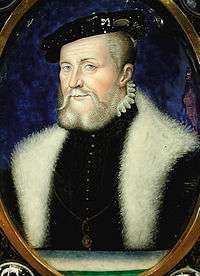 |
Anne de Montmorency, Baron and Lord of Chantilly (1493–1567) |
Grand Master of France (1526–1558) |
1 January 1515 | 1541 | Second | Reign of Francis I 1515–1547 | |
 |
Claude d'Annebault, Baron of Retz (1495–1552) |
Admiral of France (1543–1552) |
1541 | 31 March 1547 | Second | ||
 |
Anne, Duke of Montmorency (1493–1567) |
Grand Master of France (1526–1558) |
1 April 1547 | 10 August 1557 | Second | Reign of Henry II 1547–1559 | |
| — | Position vacant (absolute rule by Henry II) |
King of France (1547–1559) |
11 August 1557 | 10 July 1559 | N/A | ||
| Francis, Duke of Guise (1519–1563) |
Grand Master of France (1559–1563) |
10 July 1559 | 5 December 1560 | Second | Reign of Francis II 1559–1560 | ||
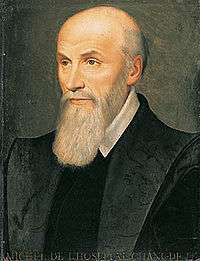 |
Michel de l'Hôpital (1507–1573) |
Chancellor of France (1560–1573) |
5 December 1560 | 13 March 1573 † | Third | Reign of Charles IX 1560–1574 | |
 |
Cardinal René de Birague (1506–1583) |
Chancellor of France (1573–1583) |
30 May 1574 | 24 November 1583 † | First | Reign of Henry III 1574–1589 | |
 |
Philippe Hurault, Count of Cheverny (1528–1599) |
Chancellor of France (1583–1588) |
24 November 1583 | 12 May 1588 | Second | ||
| — | Position vacant (absolute rule by Henry III) |
King of France (1574–1589) |
12 May 1588 | 2 August 1589 | N/A | ||
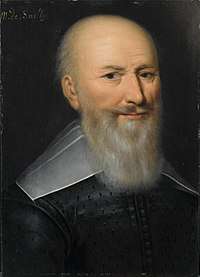 |
Maximilien de Béthune, 1st Duke of Sully (1560–1641) |
Superintendent of Finances (1600–1611) |
2 August 1589 | 29 January 1611 | Second | Reign of Henry IV 1589–1610 | |
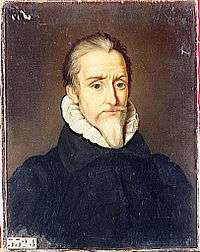 |
Nicolas de Neufville, 1st Marquis of Villeroy (1543–1617) |
Secretary of State for Foreign Affairs (1594–1616) |
30 January 1611 | 9 August 1616 | Second | Reign of Louis XIII 1610–1643 | |
 |
Concino Concini, 1st Marquis d'Ancre (1575–1617) |
Marshal of France (1613–1617) |
9 August 1616 | 24 April 1617 † | Second | ||
| Charles d'Albert, 1st Duke of Luynes (1578–1621) |
Grand Falconer of France (1616–1621) |
24 April 1617 | 15 December 1621 † | Second | |||
| — | Position vacant (absolute rule by Louis XIII) |
King of France (1610–1643) |
15 December 1621 | 12 August 1624 | N/A | ||
 |
Cardinal Armand Jean du Plessis, 1st Duke of Richelieu and Fronsac (1585–1642) |
Secretary of State for Foreign Affairs & War (1616–1617) |
12 August 1624 | 4 December 1642 † | First | ||
.jpg) |
Cardinal Jules Mazarin, 1st Duke of Mayenne and Rethel (1602–1661) |
Bishop of Metz (1652–1658) |
5 December 1642 | 9 March 1661 † | First | Reign of Louis XIV 1643–1715 | |
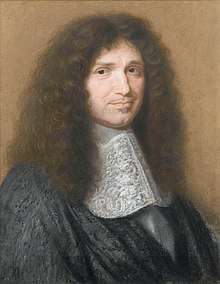 |
Jean-Baptiste Colbert (1619–1683) |
Controller-General of Finances (1661–1683) |
9 March 1661 | 6 September 1683 † | Third | ||
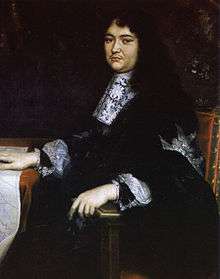 |
François-Michel Le Tellier, 1st Marquis of Louvois (1641–1691) |
Secretary of State for War & Maison du Roi (1662–1691) |
7 September 1683 | 16 July 1691 † | Second | ||
| — | Position vacant (absolute rule by Louis XIV) |
King of France (1643–1715) |
17 July 1691 | 1 September 1715 | N/A | ||
 |
Cardinal Guillaume Dubois (1656–1723) |
Secretary of State for Foreign Affairs (1718–1723) |
12 September 1715 | 10 August 1723 † | First | Reign of Louis XV 1715–1774 | |
_par_Santerre.jpg) |
Philippe II, 13th Duke of Orléans (1674–1723) |
Regent of the Kingdom (1715–1723) |
10 August 1723 | 2 December 1723 † | Second | ||
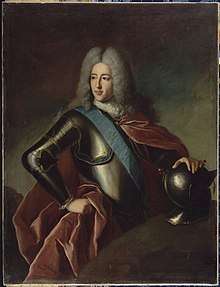 |
Louis Henri, 7th Prince of Condé (1692–1740) |
Grand Master of France (1710–1740) |
2 December 1723 | 11 June 1726 | Second | ||
 |
Cardinal André-Hercule de Fleury (1653–1743) |
Bishop of Fréjus (1699–1715) |
11 June 1726 | 29 January 1743 † | First | ||
| — | Position vacant (absolute rule by Louis XV) |
King of France (1715–1774) |
29 January 1743 | 3 December 1758 | N/A | ||
 |
Étienne François de Choiseul 1st Duke of Choiseul (1719–1785) |
Secretary of State for Foreign Affairs & War (1761–1770) |
3 December 1758 | 24 December 1770 | Second | ||
| René-Nicolas de Maupeou (1714–1792) |
Chancellor of France (1768–1774) |
25 December 1770 | 23 August 1774 | Second | |||
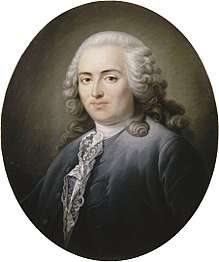 |
Jacques Turgot (1727–1781) |
Controller-General of Finances (1774–1776) |
24 August 1774 | 12 May 1776 | Third | Reign of Louis XVI 1774–1792 | |
| Jean-Frédéric Phélypeaux, 3rd Count of Maurepas (1701–1781) |
Minister of State (1776–1781) |
14 May 1776 | 21 November 1781 † | Nobility | |||
 |
Charles Gravier, Count of Vergennes (1717–1787) |
Secretary of State for Foreign Affairs (1774–1787) |
21 November 1781 | 13 February 1787 † | Second | ||
 |
Archbishop Étienne Charles de Loménie (1727–1794) |
Archbishop of Toulouse (1763–1788) |
1 May 1787 | 25 August 1788 | First | ||
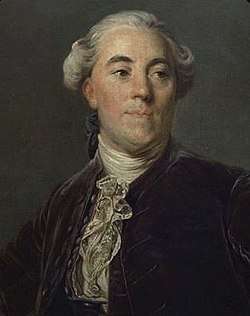 |
Jacques Necker (1732–1804) |
Controller-General of Finances (1777–1781/1788–1789) |
25 August 1788 | 11 July 1789 | Third | ||
 |
Louis Auguste Le Tonnelier, Baron of Breteuil (1730–1807) |
Secretary of State of the Maison du Roi (1783–1788) |
11 July 1789 | 16 July 1789 | Second | ||
 |
Jacques Necker (1732–1804) |
Controller-General of Finances (1777–1781/1788–1789) |
16 July 1789 | 3 September 1790 | Third | ||
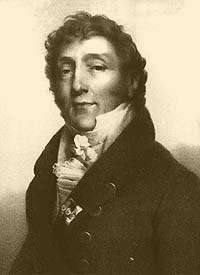 |
Armand Marc, Count of Montmorin and Saint-Hérem (1745–1792) |
Secretary of State for Foreign Affairs (1787–1789) |
3 September 1790 | 3 September 1791 | Second | ||
| — | Constitutional cabinet (supervisioned by Legislative Assembly) |
N/A | 3 September 1791 | 21 September 1792 | N/A | ||
After the 10 August 1792, Louis XVI and his family were imprisoned. However, after the fall of the First Empire in 1814, "Chief Ministers" appeared to represent the monarchy until its full Restoration. The position definitively ending only with the creation of the office of "President of the Council of Ministers" in 1815.
| Portrait | Name (Birth–Death) |
Prior/Contemporary office | Term of office | Political Party | Government | King (Reign) | ||
|---|---|---|---|---|---|---|---|---|
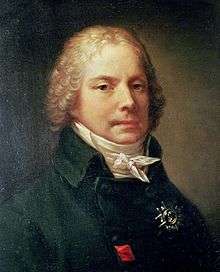 |
Charles Maurice, Prince of Talleyrand (1754–1838) |
Minister of Foreign Affairs (1799–1807) |
1 April 1814 | 2 May 1814 | Nonpartisan | Prov. Gov. | Louis XVIII (1814–1815) | |
| Creation of the Charter of 1814. Napoleon exiled in his "reign" on Elba. Removed by Louis XIII after his arrive from England, due to his Bonapartist past. | ||||||||
| Pierre-Louis, Count of Blacas[5] (1771–1839) |
Minister for the Maison du Roi (1814–1815) |
2 May 1814 | 8 July 1815 | Legitimist | King's Ministry | |||
| De facto Chief Minister, due to Louis XVIII's diffidence to Talleyrand. Despite Talleyrand was envoy to Congress of Vienna, Metternich negotiate secretly with Louis XVIII and Blacas. Fled with the Royals to Ghent during the Hundred Days. Felled in disgrace after the return in Paris, he was dismissed and send as Ambassador to the Two Sicilies. | ||||||||
See also
References
- ↑ Testament Politique du Cardinal Duc de Richelieu, Premier Ministre de France sous le Règne de Louïs XIII
- ↑ "Ancien Régime". Larousse.
- ↑ Jean Bérenger (1996). Histoire, économie et société, Vol. 15-1. Persée. pp. 37–46.
- ↑ Ancien Régime in Encyclopédie Larousse ("Après 1661, Louis XIV impose une nouvelle formule, qui joue à la fois sur les ministres et sur les conseils, sans accepter la primauté d'un ministre.")
- ↑ Emmanuel Waresquiel (2003). Talleyrand, le prince immobile. Broché. p. 488.